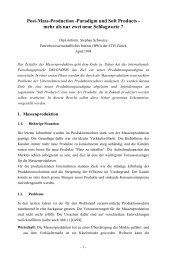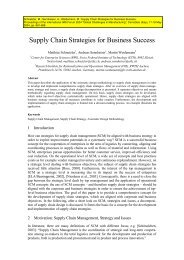The China Venture
The China Venture
The China Venture
You also want an ePaper? Increase the reach of your titles
YUMPU automatically turns print PDFs into web optimized ePapers that Google loves.
3.4.2.4 Conversation at the first meeting<br />
Chinese and Swiss/German people touch on different conversational topics at the first<br />
meeting. Europeans like to talk about things which just happened, what they studied or about<br />
their carrier, their own norms, exclusive hobbies, weekend or holiday events or about the<br />
inability of other people. Chinese tell about their own background, what they studied, their<br />
carrier, their stay abroad, food and drinks (very important!), international events, economic<br />
development, help and support offers, social relations and about everything, that is pleasant<br />
and gives a good feeling. 131<br />
<strong>The</strong>re are some topics you should not mention when you get to know your Chinese partner:<br />
• Do not praise yourself or a member of your family. However, it would be nice to praise the<br />
person you are talking to.<br />
• Do not make any critical or debasing remarks on anything.<br />
• Do not mention negative events like illness, misfortune, accident, etc.<br />
• Do not forget to show your positive sympathy and your personal interest for the well-being<br />
and welfare of the person you talk to.<br />
• Do not start controversial discussions.<br />
• Do not try to talk immediately about topics which could end in a conflict.<br />
• Do not get too near to your partner. 132<br />
Germany: <strong>China</strong>:<br />
Offensive, direct indirect defensive<br />
Active reactive, wait and see<br />
Critical take note of the communication<br />
Purposive purposive, reserved<br />
Analytical, systematically systematically<br />
Innovative, dynamically adaptable, open minded<br />
Emotional, engaged calm, self-controlled<br />
like a good colleague respectful, hierarchically distanced<br />
TABLE 3-20: Communication behaviour at the first meeting 133<br />
In short, it can be said that a German or Swiss tries to distinguish himself positively from<br />
others, that means he tries to present himself to be better than others. He does this by stressing<br />
131 Zailing/Reisch, 1994, p. 10.<br />
132 Zailing/Reisch, 1994, p. 9.<br />
133 Zailing/Reisch, 1994, p. 9.<br />
131






